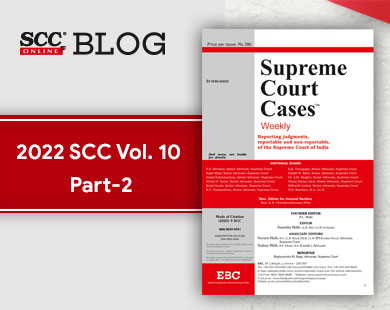Arbitration and Conciliation Act, 1996 — Ss. 14(1)(a) and 2(1)(e) r/w Ss. 11(5) and 11(6) — Application seeking termination of mandate of sole Arbitrator: In a case where there is a dispute/controversy on the mandate of the arbitrator being terminated on the ground mentioned in S. 14(1)(a), such a dispute has to be raised before the “Court”, defined under S. 2(1)(e) and such a dispute cannot be decided on an application filed under S. 11(6). [Swadesh Kumar Agarwal v. Dinesh Kumar Agarwal, (2022) 10 SCC 235]
Companies Act, 1956 — Ss. 290 and 283 to 289 and Ss. 397 & 398 — Duomatic Principle — Applicability of: Thrust of the Duomatic Principle is that strict adherence to a statutory requirement may be dispensed with if it is demonstrated otherwise on facts, that the same is consented by all members. [Mahima Datla v. Renuka Datla, (2022) 10 SCC 258]
Copyright Act, 1957 — S. 63: Offence prescribing a maximum sentence of 3 yrs, under S. 63, is a cognizable and non-bailable offence under CrPC Sch. I Pt. II. Quashing of FIR, on the premise of the offence being a non-cognizable offence, not valid. [Knit Pro International v. State (NCT of Delhi), (2022) 10 SCC 221]
Criminal Procedure Code, 1973 — Ss. 386, 374 and 390 — Discharge by High Court in appeal against conviction — Whether such discharge order can be suspended or stayed by Supreme Court: Considering S. 390 CrPC, the appellate court in an appeal against acquittal may/can even suspend the order of acquittal/discharge passed by the appellate court and, therefore, Supreme Court can suspend the judgment and order passed by High Court acquitting/discharging the accused. [State of Maharashtra v. Mahesh Kariman Tirki, (2022) 10 SCC 207]
Evidence Act, 1872 — Ss. 126 to 129: Plea of “legal privilege” under S. 129, for non-disclosure of documents/opinions to the accused is untenable, where such documents/opinions form basis for initiating criminal prosecution. Partial disclosure of relevant information/documents i.e. cherry-picking, is not permissible. [Reliance Industries Ltd. v. SEBI, (2022) 10 SCC 181]
Negotiable Instruments Act, 1881 — Ss. 118 and 4 — Money suit — Execution of promissory note — Presumption of consideration under S. 118: If presumption under S. 118 can be raised in the facts and circumstances of the case, non-examination of witness to pronote will have no effect. [Kapil Kumar v. Raj Kumar, (2022) 10 SCC 281]
Penal Code, 1860 — S. 302: In this case of double murder based on circumstantial evidence, links in the chain of circumstances were completely established. High Court, held, has not properly appreciated entire evidence on record. Findings recorded by High Court are perverse. Judgment and order of conviction and sentence imposed by trial court convicting respondent-accused under S. 302 IPC, restored. [Malti Sahu v. Rahul, (2022) 10 SCC 226]
Penal Code, 1860 — Ss. 420, 419, 467, 468, 471 & 120-B — Quashment of charge-sheet under — Whether warranted — Absence of prima facie evidence: Mere failure to verify the documents, without any further evidence against officers of Selection Committee, whether enough to implicate them, determined. [Munna Prasad Verma v. State of U.P., (2022) 10 SCC 169]
Right to Fair Compensation and Transparency in Land Acquisition, Rehabilitation and Resettlement Act, 2013 — Ss. 24(1) and (2): The High Court order that acquisition proceedings in question had lapsed, based on Pune Municipal Corpn., (2014) 3 SCC 183, on ground that compensation not paid to landowners when it was specific case of acquiring authority that possession of land in question was already taken, unsustainable. [DDA v. Bhagwat Singh, (2022) 10 SCC 213]
Securitisation and Reconstruction of Financial Assets and Enforcement of Security Interest Act, 2002 — Ss. 14(1-A), 38 and 14(1) r/w R. 8 of the 2002 Rules — Taking possession of secured asset: Scope of power of District Magistrate/Chief Metropolitan Magistrate to appoint an advocate and authorise him/her to take possession of secured assets and documents relating thereto and to forward the same to secured creditor, within meaning of S. 14(1-A), explained. An advocate is and must be regarded as an officer of court and subordinate to CMM/DM for purposes of S. 14(1-A) of the SARFAESI Act, 2002. [NKGSB Coop. Bank Ltd. v. Subir Chakravarty, (2022) 10 SCC 286]
Service Law — Appointment — Compassionate appointment: Compassionate appointment cannot be extended to legal heirs of retiring/superannuating employees since that would be contrary to object of granting compassionate appointment, and hence would be violative of Arts. 14 and 16 of the Constitution. [Ahmednagar Mahanagar Palika v. Kamgar Union, (2022) 10 SCC 172]
Specific Relief Act, 1963 — S. 38: Permanent injunction sought on contradictory grounds: of ownership, and, on basis of adverse possession, held, untenable. [Kesar Bai v. Genda Lal, (2022) 10 SCC 217]







